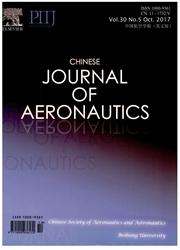

 中文摘要:
中文摘要:
An improved delayed detached eddy simulation(IDDES) method based on the k-x-SST(shear stress transport) turbulence model was applied to predict the unsteady vortex breakdown past an 80 /65 double-delta wing(DDW), where the angles of attack(AOAs) range from 30 to 40. Firstly, the IDDES model and the relative numerical methods were validated by simulating the massively separated flow around an NACA0021 straight wing at the AOA of 60.The fluctuation properties of the lift and pressure coefficients were analyzed and compared with the available measurements. For the DDW case, the computations were compared with such measurements as the mean lift, drag, pitching moment, pressure coefficients and breakdown locations.Furthermore, the unsteady properties were investigated in detail, such as the frequencies of force and moments, pressure fluctuation on the upper surface, typical vortex breakdown patterns at three moments, and the distributions of kinetic turbulence energy at a stream wise section.Two dominated modes are observed, in which their Strouhal numbers are 1.0 at the AOAs of30, 32 and 34 and 0.7 at the AOAs of 36, 38 and 40. The breakdown vortex always moves upstream and downstream and its types change alternatively. Furthermore, the vortex can be identified as breakdown or not through the mean pressure, root mean square of pressure, or even through correlation analysis.
 英文摘要:
英文摘要:
An improved delayed detached eddy simulation (IDDES) method based on the k-x-SST (shear stress transport) turbulence model was applied to predict the unsteady vortex breakdown past an 80o/65o double-delta wing (DDW), where the angles of attack (AOAs) range from 30° to 40°. Firstly, the IDDES model and the relative numerical methods were validated by simulating the massively separated flow around an NACA0021 straight wing at the AOA of 60°. The fluctuation properties of the lift and pressure coefficients were analyzed and compared with the available measurements. For the DDW case, the computations were compared with such mea-surements as the mean lift, drag, pitching moment, pressure coefficients and breakdown locations. Furthermore, the unsteady properties were investigated in detail, such as the frequencies of force and moments, pressure fluctuation on the upper surface, typical vortex breakdown patterns at three moments, and the distributions of kinetic turbulence energy at a stream wise section. Two dominated modes are observed, in which their Strouhal numbers are 1.0 at the AOAs of 30°, 32° and 34° and 0.7 at the AOAs of 36o, 38° and 40°. The breakdown vortex always moves upstream and downstream and its types change alternatively. Furthermore, the vortex can be identified as breakdown or not through the mean pressure, root mean square of pressure, or even through correlation analysis.
 同期刊论文项目
同期刊论文项目
 同项目期刊论文
同项目期刊论文
 期刊信息
期刊信息
